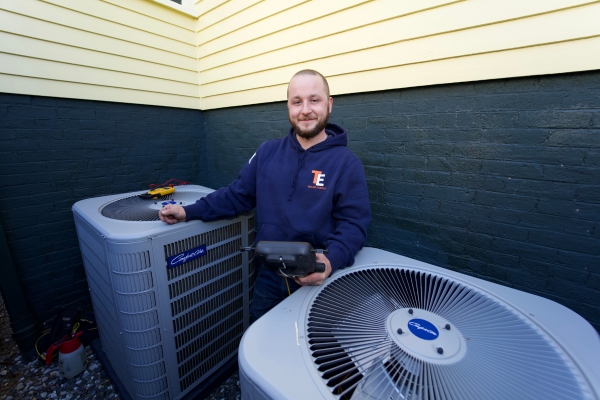Contents
- SEER Ratings & Their Effect on Air Conditioning Efficiency
- Mismatched Cooling Systems
- The Risks of Incorrectly Sized Air Conditioners
- Maintaining Efficiency with Well-Matched HVAC Systems
- Other Factors in Choosing the Right HVAC System
- Air Conditioning FAQs
- What Should You Consider When Replacing An Air Conditioner?
- Why Is The Seer Rating Important When Choosing A New Air Conditioner?
- How Does A Mismatched Air Conditioning System Impact Efficiency?
- Why Consult A Certified HVAC Contractor Before Replacing An Air Conditioner?
- What Maintenance Practices Help Extend The Life Of A New Air Conditioning System?
- Conclusion
- Contact Taylor Energy for Expert HVAC Services
Selecting the ideal air conditioner extends beyond just the model—it’s crucial for maximizing your home’s energy efficiency and comfort. The Seasonal Energy Efficiency Ratio, also called the air conditioner SEER rating, is critical to this process, reflecting how efficiently an air conditioner operates in terms of electricity usage for cooling your environment.
According to the U.S. Energy Information Administration, residential air conditioning systems should have a minimum SEER rating of 14, though this can differ depending on state regulations. This article from Taylor Energy will delve into the importance of SEER ratings and their effects on utility costs and indoor comfort.
SEER Ratings & Their Effect on Air Conditioning Efficiency

The SEER rating quantifies how much cooling an A/C produces for each unit of energy consumed throughout a typical cooling season. SEER ratings can go from 13 to 21, where higher ratings signify better energy efficiency. Air conditioners with a higher SEER rating utilize less energy to achieve the same cooling level as those with a lower rating, leading to lower energy expenses and reduced environmental impact.
Upgrade to a high-efficiency air conditioner and enjoy lower energy bills. Reach out to Taylor Energy for your installation needs.
Why SEER Ratings Matter for Your Air Conditioner
Understanding an air conditioner’s SEER rating is essential before installing it, as it has several benefits. A unit with a high SEER rating cools your home more efficiently, using less energy to maintain comfortable temperatures and reducing energy bills.
Moreover, an air conditioner that is appropriately sized for your home, such as one suitable for a 4-bedroom residence, should be capable of lowering temperatures by 10 degrees Fahrenheit within three hours, ensuring comfort. Additionally, systems with higher SEER ratings are better for the environment, as they reduce greenhouse gas emissions, making them an eco-friendly option.
Choosing the Best SEER Rating for Your Home

A SEER rating of 14 or above is recommended for efficient home cooling. However, the optimal SEER rating for your home depends on factors like size, specific cooling needs, and energy usage preferences. While higher SEER ratings indicate better efficiency and energy savings, the performance of your HVAC system is also determined by how well it matches the size of your space.
For example, a 14-SEER unit may suffice for a two-bedroom house, but a larger five-bedroom home might require a system with a higher SEER rating for equivalent efficiency. Consulting an HVAC professional can help assess the best SEER rating for your needs. Larger homes have more space to cool than smaller ones, increasing the overall cooling demands.
A higher SEER rating signifies better energy efficiency, so a cooling system with a higher SEER can deliver the required cooling with less energy consumption. In a larger home with higher cooling demands, an AC with a higher SEER rating can maintain comfort more effectively, potentially lowering energy consumption and operating costs.
For reliable, expert HVAC solutions, trust Taylor Energy. Call us for your air conditioner installation, repair, and maintenance needs!
How to Determine Your AC’s SEER Rating
To find the SEER rating of your air conditioner, you need to divide the annual total cooling output by the yearly electricity input. Begin by multiplying the air conditioner’s cooling capacity, measured in British Thermal Units per hour (BTU/h), by the typical number of hours it operates in a day and then by the number of days it runs in a year. For instance:
A system with a cooling capacity of 5,000 BTU/h running for 8 hours daily for 120 days, resulting in 4,800,000 BTUs annually. If this system consumes 500,000 watt-hours (Wh) in a year, the SEER rating would be calculated as follows:
SEER = 4,800,000 BTUs / 500,000 Wh = 9.6
This calculation determines the air conditioner’s efficiency throughout a standard cooling season.
Finding the SEER Rating on Your Air Conditioner

According to U.S. Department of Energy regulations, HVAC manufacturers must display the SEER rating on their units. Models that achieve or surpass specific energy efficiency standards carry the Energy Star label, indicating high efficiency.
To locate your air conditioner’s SEER rating, check for a yellow and black EnergyGuide sticker on the side of the condenser unit. This sticker will display the SEER rating, providing insight into your system’s efficiency.
If the SEER rating isn’t evident on the condenser unit’s EnergyGuide sticker, check the air handler unit as an alternative. If this approach doesn’t yield results, you can find the SEER rating online. Collect the manufacturer’s name, model number, and serial number of your HVAC system and use these details to search online or reach out directly to the manufacturer.
If you need help locating the SEER rating or encounter issues such as unclear labeling, consider consulting a professional HVAC contractor. While finding the SEER rating is typically straightforward, professional assistance can ensure accuracy and resolve complications.
Mismatched Cooling Systems
Your air conditioning system’s condenser unit and air handler must be properly matched for optimal efficiency. Manufacturers design specific air handlers to work with certain condensers, highlighting the necessity of using compatible pairs during installation.
Mismatched components in air conditioning systems are often the result of installations by inexperienced contractors. Such mismatches can lead to reduced efficiency, more rapid wear and tear, and a higher likelihood of breakdowns. This underscores the importance of engaging skilled and knowledgeable HVAC professionals for installation.
Ensure your home stays cool and efficient this summer with expert home cooling solutions from Taylor Energy—call us today!
The Risks of Incorrectly Sized Air Conditioners
Selecting a correctly sized air conditioning unit is critical to ensure it matches your home’s needs. An improperly sized unit—whether too large or too small—can lead to issues.
Oversized units may result in short cycling, where the air conditioner frequently turns off and on. This fails to effectively remove humidity or purify the air, resulting in discomfort and poor indoor air quality, increases energy consumption, and raises utility bills.
An undersized air conditioning system must run longer to cool an area, putting excessive strain on the unit. This constant overworking leads to increased wear and tear, frequent repairs, and potentially premature system replacement. Homeowners with undersized systems often encounter high energy costs and need help maintaining a comfortable indoor environment.
Maintaining Efficiency with Well-Matched HVAC Systems

A high SEER rating alone cannot overcome the inefficiencies of a mismatched cooling system. Proper installation by a professional who understands the importance of pairing the suitable condenser unit with the air handler and sizing the system correctly for your home is crucial for maintaining optimal efficiency.
Other Factors in Choosing the Right HVAC System
Selecting the best HVAC system for your home involves more than considering the SEER rating. Here are additional important aspects to keep in mind:
- Air Conditioning System Size: Oversized and undersized units can increase energy usage and reduce comfort. Correct sizing is essential for efficient performance and extending the system’s lifespan.
- HVAC Warranty Coverage: A robust warranty can provide reassurance by covering necessary repairs or replacements should the system underperform. Review the warranty details to understand the coverage scope and confirm it offers sufficient protection.
- AC System Noise: Less efficient systems often work harder, which can lead to higher noise levels. Choosing a quieter unit can significantly improve your home environment.
- Air Conditioner Cost: It’s essential to find a system that fits your budget while still meeting your needs for quality and efficiency. Plan your finances carefully to ensure a cost-effective purchase.
By considering these elements along with the SEER rating, you can make a more informed decision that optimizes efficiency, comfort, cost, and longevity.
Air Conditioning FAQs

Explore common questions and answers about air conditioning to help you better understand and manage your cooling system.
What Should You Consider When Replacing An Air Conditioner?
When replacing your air conditioner, key factors include your home’s size, budget, energy efficiency requirements, and specific comfort preferences to ensure the new system effectively meets all your needs.
Why Is The Seer Rating Important When Choosing A New Air Conditioner?
The SEER rating is vital in selecting a new air conditioner because it measures the unit’s energy efficiency. A higher SEER rating means better efficiency, which can translate to considerable energy savings over the system’s lifetime.
How Does A Mismatched Air Conditioning System Impact Efficiency?
If the components of an air conditioning system, such as the indoor coil and the outdoor unit, are not correctly matched, it can seriously undermine the system’s efficiency. This mismatch can result in decreased performance, elevated energy usage, and higher operating costs.
Why Consult A Certified HVAC Contractor Before Replacing An Air Conditioner?
Consulting with a certified HVAC contractor before replacing your air conditioner offers numerous benefits. They provide expert advice tailored to your needs, help select the right equipment based on your home’s requirements, ensure proper installation, and offer maintenance tips to enhance the system’s efficiency and longevity. Additionally, they can assist you in accessing rebates or incentives for energy-efficient upgrades.
What Maintenance Practices Help Extend The Life Of A New Air Conditioning System?
Regular maintenance is essential to prolonging the lifespan of your new AC system. This includes cleaning or changing air filters, clearing the outdoor unit, checking ductwork for leaks, and arranging professional tune-ups. These practices ensure the system operates efficiently, prevent expensive repairs, and extend its lifespan.
Conclusion
Selecting an A/C unit with a high SEER rating is essential for maximizing energy efficiency and minimizing costs. Choosing an ENERGY STAR Certified unit can reduce energy expenses and enhance environmental sustainability. Consulting with a professional HVAC contractor is advisable for expert advice on picking the perfect HVAC system and keeping it running efficiently. Their expertise ensures you select a system tailored to your needs, maintaining comfort in your home throughout the year.
Contact Taylor Energy for Expert HVAC Services
Taylor Energy delivers top-notch heating and cooling solutions across Northern Connecticut. Our team comprises highly qualified technicians who excel in HVAC tune-ups, repairs, installations, and replacements. With deep expertise and extensive experience, our technicians ensure your HVAC system operates optimally.
We pride ourselves on offering highly competitive costs for heating and cooling services. Our maintenance services are engineered to enhance your comfort and increase energy efficiency, helping to lower your heating and cooling bills. Should you require HVAC repair or a new system, we are here to recommend the best solutions that fit your budget. We stand behind our work with a satisfaction guarantee. For a free, in-home estimate and to schedule your next service, call Taylor Energy today.
You can click here to contact us now or call us at (860) 623-3308 to find out more! Click the link to view our service area.

Related Articles:
